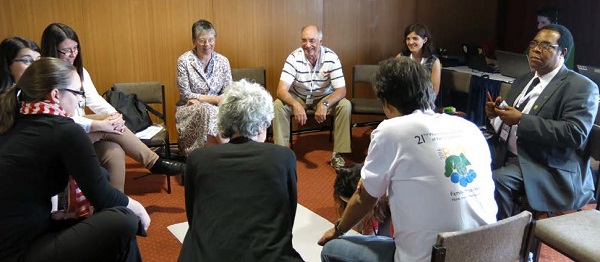New WONCA working party under way
WONCA Working Party on Indigenous and Minority Groups Health Issues
He aha te mea nui o te Ao? He tangata! He tangata! He tangata!
What is the most important thing in the world? It is people! It is people! It is people! – Māori proverb

Tena koutou
The first workshop of the WONCA Working Party on Indigenous & Minority Groups Health Issues drew people from around the globe.
There were representatives from Africa, Europe, South East Asia, North and South America and the Pacific. Those people came from Nigeria, Spain, Indonesia, the UK, the USA, Canada, Italy, Australia, New Zealand and Brazil.
Our reasons for participation and what we wanted to get out of the new group brought forth a list of 19 themes to examine and select next steps.
One very clear message was that developed countries should take a different stance on how to help developing countries address their health issues.
Instead of taking the lead, telling developing countries what to do, based on their own standards, developed countries should consider listening, understanding and responding more to what developing countries are saying.
There is strong support and willingness to participate and to take this mahi (work) further.
Themes
1. Identification of indigenous and minority groups (IMG)
- Issues connected IMG in our respective countries, communities and professional organizations.
2. Resources
- Lack, paucity, distribution or quality of resources
3. Culture
- Dominant systems’ perspectives a major issue regarding the status of how different systems deal with IMG
- Culture of IMG themselves based on ethnicity, gender, social status, own belief systems, myths. Particularly for Roma (Gypsy) populations which is of more concern in Europe
- Issue of communication and skill-sets with regard to doctors being able to engage with their patients and around lack of skills and understanding of IMG.
- Using culturally appropriate methods rather than one size fits all.
4. Power imbalance
- In all respects, especially with regard to indigenous populations who are, in most cases, dislocated from their rightful place and land, and also for others who have been dislocated and have never been considered as being part of a particular place.
5. Mobility
- Nomad aspects of certain populations.
6. Research
- Lack of research, and meaningful approach to research, in IMG issues is a significant area that may need to be addressed.
- Acknowledging different world views and this needs to be done through IMG lens.
7. Systems/political regimes
- Some are causing poverty where IMG always find themselves at the bottom of the heap.
- Specific countries could identify some of these concerns, eg:
- Africa has 35-40% indigenous populations but their health status remains poor: marginalization, HIV and local customs on how you address this
- In the Amazon, indigenous people are difficult to contact.
- Mayan people in Mexico are not even counted so they are totally ignored. Acknowledging that their indigenous people do exist is a very important start to see what effects that has on entire system
8. Maternal health
- High maternal morality and anaemia rates, especially in Indonesia and Papua New Guinea.
9. Lateral violence
- Domestic and indigenous group causing harm to their own people.
10. Teenage pregnancy
- High rates in some countries’, like Nigeria, minority groups addressing the impact or core family values.
11. Lack of aspiration
- How this leads to despair and people not being motivated to push forward.
12. Equity
- Very strongly felt by all people
- The need to have meaningful health care for IGM, not just throwing money into the system, to help the people with the greatest needs. Which are usually marginalized populations
13. Empowerment
- Not just in health but socially; how communities are engaged and can self-determine their future.
14. Racial issues
- Need for more education to address discrimination.
15. Alcohol abuse
- The significant increase in the use of alcohol and suicide in indigenous populations
- Lack of access to resources, especially in Brazil.
16. Big petroleum company influence
- Countries like Nigeria are rich in oil exploration and water supplies, but the water is polluted and they have the worst population health and minority health outcomes.
17. Prostitution
- Italy raised the problem of Nigerian prostitutes and hardship issues they have
18. Gypsies and homelessness.
19. Anti Islamic practices
- In the UK and increasing divisive across the world.
Next steps
For those people interested in working with us, please consider joining our working party.
We will have an online newsletter in due course that you will also be able to sign up to.
I have set up a Facebook page for the working party to collaborate and share news, ideas, research, sponsorships and developments on a daily or weekly basis online. I encourage your all to like the page so that it flourishes as an informal international forum for our work.
If you are part of the Twitter sphere please do also follow WONCA Indigenous, @WONCAindigenous, tweets, share them and make sure we are following you!
It will be some time no doubt until we can all meet kanohi ki te kanohi (face to face) so these “new” online networking tools are an ideal way to build bonds and expand our network.
I am working to raise awareness and secure support from relevant leaders in their fields, and will keep you abreast of any developments on Facebook and through Twitter, and this website. Remember you can direct message me through any of those channels as well.
Naku iti nei
Tane
Dr Tane Taylor (Chair)
WONCA Working Party on Indigenous & Minority Groups Health Issues